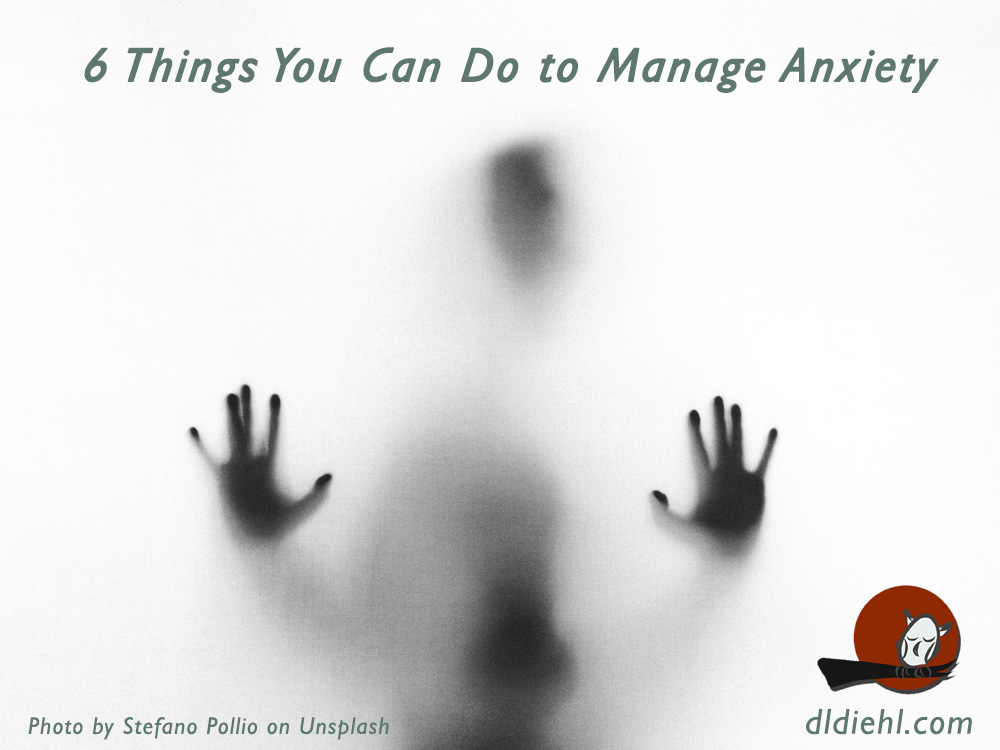Are you cool as a cucumber under pressure? Do you surf the changes in your life with a grin like you’re riding the Big Wave? If so, I envy you, my friend. On the other hand, if you have had more than one person tell you
that you need to chill, relax, or not be so uptight, then let’s talk. For many of us, anxiety is a nearly constant companion–when it’s not doing a tag team routine with depression. We are the worriers. (My anxiety takes “bio breaks” from time to time, but it’s seldom gone long.)
Before I go further, here is a cheat sheet for those not into reading articles. I put the list right here at the top. But I’ll bet you’ll feel better if you read the details in the rest of the article, because I explain at least 14 things you can do and at least one is going to be right for you. Here they are! Cultivate acceptance, be yourself, embrace compassion, embark on some fundamental attitude changes, train your brain, tweak your lifestyle.
What is Anxiety?
The word gets tossed around a lot. Google Dictionary defines it as “a feeling of worry, nervousness, or unease, typically about an imminent event or something with an uncertain outcome.” Does that sound like an understatement to you?
I’m not talking about the helpful if annoying anxiety that boosts our memory for final exams or right before we go on stage. Neither am I talking about the butterflies before a big race that help us beat our best time. I’m talking about the kind that grinds down our immune system, puts us through gruelling abdominal contortions before an important presentation, and causes us to turn in a blank anatomy exam after weeks of preparation (yeah, I did that).
It’s a mental disorder that over 40 million Americans suffer from. We spend billions of dollars a year on medications to deal with it. That doesn’t count all the money spent on alcohol that some of us consume to counter anxiety’s uncomfortable grip. We make countless trips to ER thinking our panic attacks are heart attacks–which they mimic. So if you’ve got it, you are not alone. There are different ways to help those who are suffering from anxiety. Some people find that using supplements similar to etizoco could be helpful, if you have any questions about using supplements for your anxiety, you may want to talk to your doctor to see if they are right for you.
Whence cometh the Anxiety Beast?
I would like to just take this opportunity to let you know when and why my anxiety started. I was about 23 and on the way home from a party one night, I was completely sober. I was just driving down the highway and all of a sudden someone went straight in the back of me and I ended up in a really bad accident. I was in the hospital for a couple of weeks and I lost my car. I later found out that the person who crashed into me was drinking and it just made me so angry. Why would anyone want to put someone else at risk? It just isn’t fair. So I did get help to support my court case against this person (learn more here), however, this whole period was one of the most stressful times of my life. I was struggling to sleep, eat, focus, nothing was the same. I feel like I needed to share that just to get it off my chest, but this article isn’t about me, I just think its important to open up about anything you think affects your anxiety to get it off your chest and help the process.
I’m not proposing to unravel in this article the reasons why this condition is such a growing issue. Instead, I’d like to focus on a few obvious situations in the here and now and what we can and can’t do about them.
Anxiety is generated inside of us. Did I just tell you it’s all in your head?! Yup. Mine, too. It may be a default way of being–how our brains are wired, so to speak. It may occur after an excessively stressful time in your life. (I say “excessively” because we are always dealing with stresses unless we are living a Walden life.)
But it always raises its head in reaction to things that happen around us. Have you ever met someone who obsesses over every odd remark as if someone has challenged their honor? Nothing rolls off their back. Maybe you are the one who keeps thinking for hours about what you could have said to that annoying checkout clerk who intentionally puts the eggs on the bottom of your bag under the canned goods every time while making snarky remarks. Can we agree right now that this is probably not healthy?
There are tons of books out there about the topic, but I find that short lists are great, low-pressure reminders to help me get my worry spikes closer to the chill zone. Because anxiety is in our heads, our heads are what we need to change. I’d like to suggest 3 main ways we can work on those changes: fundamental attitude changes, brain training, and lifestyle management.
A. Fundamental attitude changes
Changing your attitude takes some time. But there is no time like right now to start molding your attitudes into works of art made by you. Who you are is not set in stone. You have the power to tweak your attitudes.
- Cultivate acceptance: much anxiety comes from a feeling of being out of control. We want the world to be the way we want. Life should be fair. If you haven’t noticed already, it’s not. So it’s time for some tough self-love. You can’t change death or taxes or the fact that the neighbor’s tree fell on your new car. You can’t change your childhood, and you can’t change your boss’s micromanaging everything you do. You can’t even change some of your own brain chemistry. Once you really let this soak into the core of your being, you’ll feel the change start. I didn’t say it would be easy, but a head start on acceptance is essential for getting your anxiety demons to play nice. Take as much time as you want for this step. Go ahead, we’ll wait.
- Be yourself: while you are working on accepting the world and yourself as you are, let’s enlarge on that. BE yourself. Stop judging every little thing you do, eat, or wear and and stop worrying about how others judge you. A dear friend with her own eclectic and well put-together style related to me a time she was window-shopping in a high-end, high fashion store–the kind where everything is decorated in ecru. A fellow shopper approached her and said in all sincerity, “I wish I had your courage; I would love to wear bright colors.” How sad for her! Being okay with being yourself, including how you look, where you went to school, your temperament, your grade average, and your job is just being honest about reality with no judgement. Sure there are exceptions. You do have to care about what the boss thinks of you since your raise is riding on it and what the police officer thinks of you when she pulls you over for a missing tail light you meant to fix. But generally, allowing yourself some self-expression can relieve a lot of submerged mental tension. Check out a humorous book by Sara Knight called “You Do You” for a rollicking intro to being yourself.
- Embrace compassion: I think that many anxious people have an abundance of compassion toward animals and humans who are suffering. In fact, awareness of global suffering can feed into anxiety. However, I’d like you to consider expanding that compassion even to the angry, obnoxious people. How in the world did they get that way? Once you realize some of them are hurting, too, some of their actions may not trigger you so much.I don’t mean that you should give a pass to abusers. But expand your compassion to that nerve-grating cousin who always brags so much at family gatherings. You might feel less anxious at the next reunion. And make sure you extend that compassion to yourself, too. If you blurt out something awkward at a meeting or screw up you kid’s science project by leaving it in the hot car, forgive yourself after you let her vent her anger.
B. Brain training for anxiety management
Brain training can take many forms. Just like physical training, it takes repetition, increasing challenges, and rest between sessions for proper growth. There are tons of gurus and apps out there offering brain training. I’ll summarize a few kinds here.
- Affirmations: giving yourself messages over and over that focus on positivity and where you are going are great for quelling anxiety. They can be goal oriented or attitude oriented. They can be generic–“I’m fine just the way I am!”–or specific–“Any boss would be lucky to have someone who can pack 572 widgets per hour on their team during Squeeze Week!” There are lots of ways to do affirmations. You can write them over and over until they are part of your daily thinking. You can chant them in mantras. You might tape them to your bathroom mirror or inscribe them in beautiful artistic journals. Speaking of journals–
- Journaling: writing out your thoughts, including your problems and goals, can relieve an immense amount of nervous energy that might otherwise express itself as anxiety. I’m talking about a brain dump, not a to do list. Taking the time to form your thoughts into coherent sentences organizes while it calms. It also gives you a little intellectual distance from your emotional baggage. Getting it out of your brain and onto paper or into digital memory can be liberating. No one is going to grade this, so don’t worry about mistakes or wording, just get it out of your head.
- Meditation: This method is an underappreciated and often misunderstood methodology for getting a handle on your anxiety. “But I can’t empty my mind of thoughts,” you might say. “My brain is always racing!” Here is the good news: meditation is not about emptying your mind. It’s a way to not let your thoughts and emotions run amok. It’s a way to realize that your thoughts are not identical with you. This hearkens back to acceptance above.People have made remarkable gains using short, basic meditation exercises so that breaks from anxiety become part of their daily routine. Repetition makes for new neural pathways. For a functional, non-religious introduction to meditation, consider the book and free app from Dan Harris called “10% Happier.”Do be aware that if you have had serious childhood trauma, don’t force yourself into some lengthy meditational regimen. Consider therapy first. See #4 below.
- Therapy: I can’t say enough good things about therapy. There are all kinds, and they serve different purposes. Generally, though, they are good at helping you understand yourself better and helping you accept your past. Some therapy methods don’t change behaviors, but they do help you know yourself well enough to ameliorate some of the anxiety associated with issues and baggage that we carry around with us. Other methodologies focus on changing behaviors, such as managing anger or addictions. Not all therapies or therapists may be right for you. But one or more will be. I think a little–or a lot–of therapy for everyone on the planet would make it a lot better place
C. Tweak your lifestyle for anxiety management
We may not all be able to move away from noise and air pollution or change to less stressful jobs. But there are things that we do have some choices about and that we can practice to help our own bodies and minds handle daily stresses so they don’t trigger unmanageable anxieties. Most of these will be obvious. But if you aren’t already practicing one or more of these, you know you need the reminder, right?
- Good diet. Fruits and veggies. Of course. Lots. Good fats (avocados?) Hydration. Agua por favor. (Note to self: stop binging on ice cream) You can also try herbal supplements, slowly introducing them to your diet to help calm and relax yourself. Kratom is a popular remedy with anxiety relief as well as improving your focus and boosting your energy. Looking through a Kratom Quick Guide can give you some suggestions on how to handle your anxiety.
- Exercise: regular frequency & aerobic intensity if it is safe for you; walk, jog, run, bike, swim, prancercise (video). Exercise to manage anxiety ought not be associated with work so you can clear your mind, listen to an audiobook or music or take in the surroundings. Force yourself. I swear you’ll thank me. Then you can force me.
- Information management: For those of us with anxiety, the constant availability of bad news and negativity heightens our problem. I love the Age of Technology. But we have a problem of abundance. So don’t be afraid to make some changes.
- Stop following people on social media who always post animal cruelty articles. You are already aware. You don’t need more outrage in your life.
- Consider not watching or reading the news. At least cut down on frequency and change to sources that aren’t blasting the latest atrocity on a scrolling bar or pop-up video. I’ve pretty much eliminated news from my reading and watching. Yes, I’m less informed, but I can selectively find topics I’m interested in.
- This goes for in-person situations, too. You have a right to cut people out of your social circles who are always talking trash about people or reveling in the latest awfulness.
- Socialization. We are tribal apes. Interaction with other humans is one of our requirements. Socialization is one of the reasons churches are so successful as a social construct. Spending time with peers and strangers can be tough for introverts. So look for safe spaces with people you enjoy, even if you consider yourself a loner. I’m not sure if online gaming and chatting fulfills all our socialization needs, since they exclude essential facial communication, body language or touch. But it’s a start. Organized meetups can help find like-minded folks. Or start your own. I go to a writers’ group once a month. I’m signed up for meetups on philosophy, art, and science fiction that I swear I’ll attend soon. Find your tribe. Take the effort to get out of the dark recesses of your cave and climb down from the mountain. Very few of us can maintain healthy psyches as mountain men. This is why solitary confinement is considered a punishment.
- Deep breathing. Oxygenation is essential. So breathe intentionally: meditative, conscious, mindful, slow, fully expansive breaths. As long as you are not in an iron lung, this is an option for managing your inner physiology. And it is scientifically proven to make a difference. I have proven I can lower my blood pressure at the doctor’s office with breathing and visualization. Every time I practice intentional breathing, I realize my face is taut, my shoulders are up around my ears, my gut is clenched, and my posture sucks. A few, slow deep breaths in succession can be a quick step back from the ledge. Breathing exercises are often associated with meditation and mindfulness. But you don’t have to get all crystal-blue-persuader. Plain, old, slow, deep breathing while counting can reduce anxiety.
- Nature and water features: Recent research in Japan indicates that certain trees give off volatile compounds that improve the immune system when you walk through a forest. Some Japanese companies are rewarding employees with forest getaways. Even if you are not near a forest, resting your eyes on green plants in a conservatory can be quite calming. Walking by the ocean, a river or a pond can allow tension to drain out of you. I’m partial to waterfalls, fountains, and gurgling brooks.
- Sleep. Did you know your brain acts like a pump when you sleep, widening spaces between cells and pumping out cellular toxins that drain through the brain’s recently discovered lymph system? Cool, huh? It’s essential to good mental and physical health. Here are some things that I use to calm my irregular sleep:
- Sound. I use a free app called Ambience that provides pages and pages of sounds and calming musical loops. There are several types of rain sounds, plus birds, city sounds, outdoor sounds, etc. They provide pre-made combos. I listen with soft, cushy headphones that look more like a headband. I LOVE THIS APP!
- Exercise helps, too, but not immediately before sleep. Do it earlier in the day to help sleep patterns.
- Tea, non-caffeinated. Supposed to help. At least you are hydrated. I use Sleepytime or Sweet Dreams tea.
- Avoidance of caffeine and theobromine: I can’t eat chocolate after noon if I want to fall asleep at a healthy time. If you have anxiety and associated sleep disturbances, managing blood levels of these stimulants can make a huge difference.
- Eye mask: even the smallest light from electronics (charging phones or computer monitors) has been proven to confuse sleep cycles. Plus, I find a soft eye mask acts like swaddling and makes me feel safer and more calm.
- Ear plugs: High anxiety people or those suffering from CPTSD (Complex Post Traumatic Stress Syndrome) tend to be hypervigilant. Any little sound can bring you out of sleep or prevent getting to sleep. I use my headphones or ear plugs (ear buds hurt my ears). Helps for sleeping with a snorer, too.
- Weighted anxiety blanket: I just got this, and it’s wonderful. Throughout my life, I could not nap. I curl up under this, and go fetal. They caution you not to use it around children or small babies and not to let pets get underneath. They are heavy. I got one for warmer climates, and I love it.
There are tons more methods to relax. Read. Read boring books. Visit museums. Look at art in person or online. Sing. Dance. You could also consider using cbd promo codes to buy CBD as a method to manage your anxiety. Mix and match any or all of the techniques above. I’d love to hear your favorite way to chill in the comments.
Keep in mind, I’m talking about First World situations. I can’t even begin to fathom the anxiety that people must endure who are refugees exiled from home or undergoing dire scarcity of basic resources. But we all face life’s ups and downs. We all walk in our own shoes. Whatever situation we are in, some of us will experience anxiety over the negative pressures and stresses of life, no matter how good our physical and financial circumstances are. I believe we can be better world citizens more capable of giving back if we are able to approach our lives and the world with calm.
With sparkle,
D. L. Diehl
Photo by Stefano Pollio on Unsplash
Diana Diehl
Latest posts by Diana Diehl (see all)
- Free Family Fun — Adventure at the OCCBF - September 9, 2018
- 6 Things You Can Do To Manage Anxiety - August 27, 2018
- How to save a dog and and avoid frightening surprises - May 23, 2018



